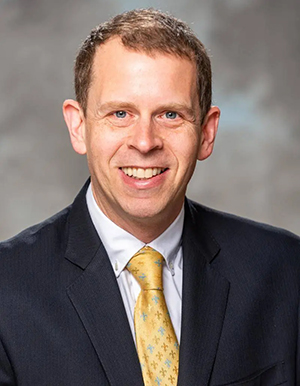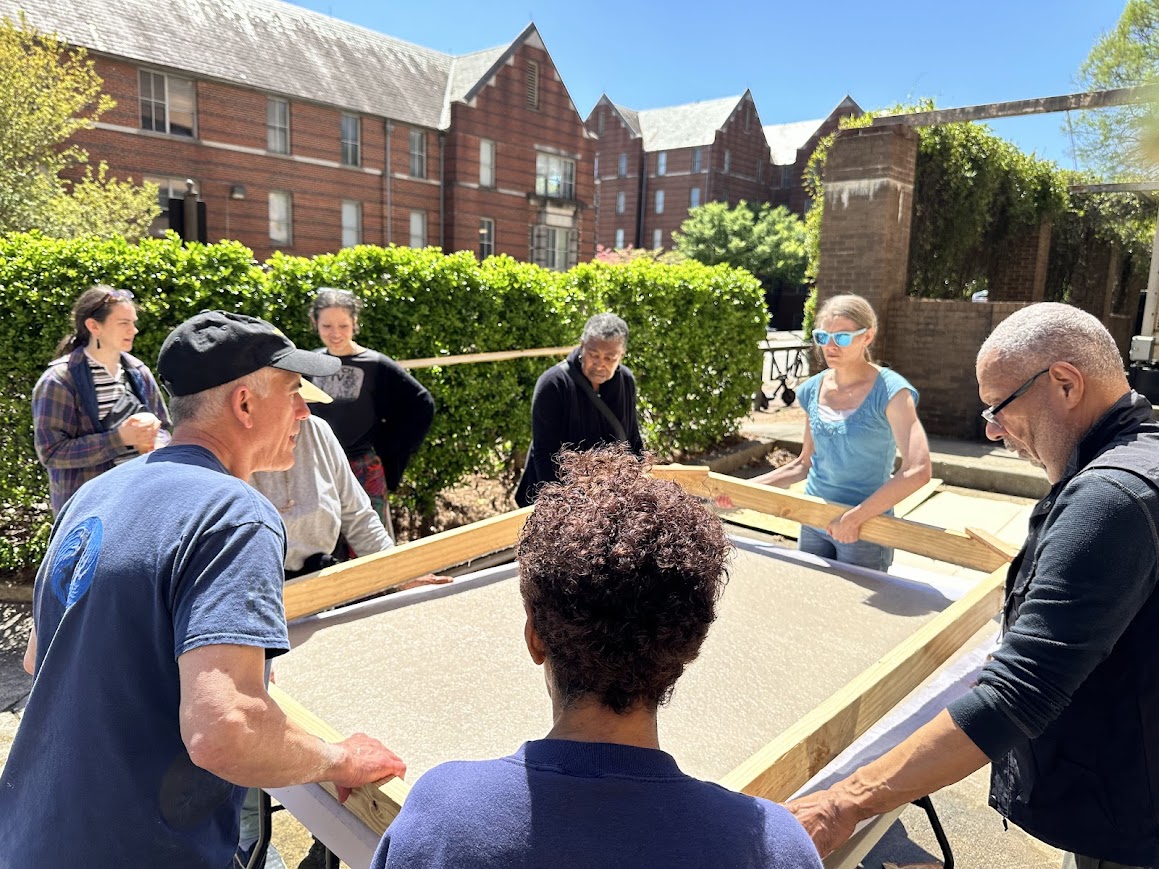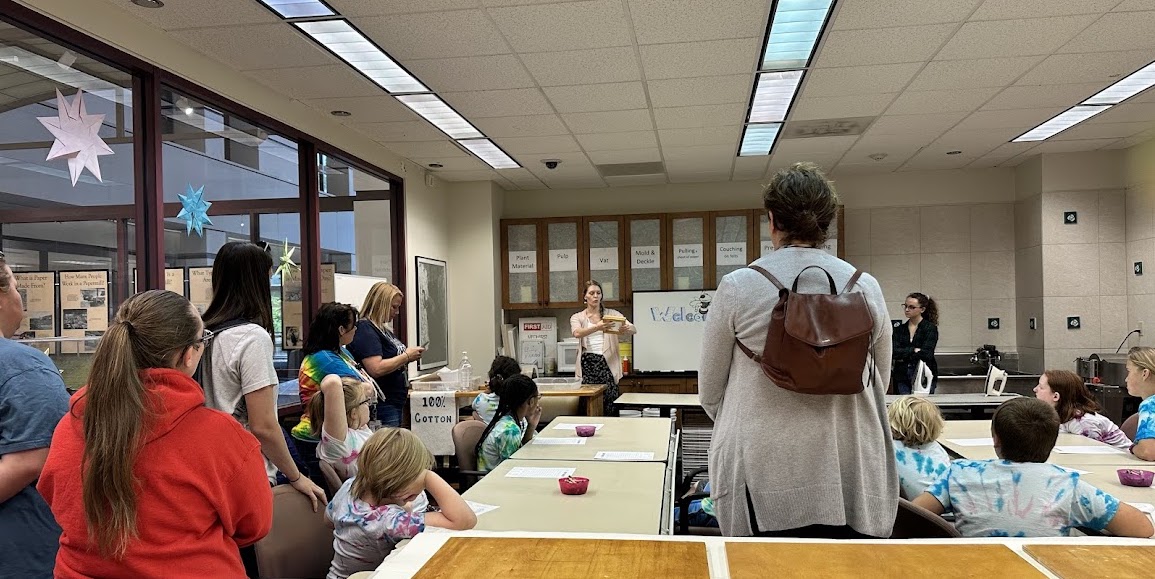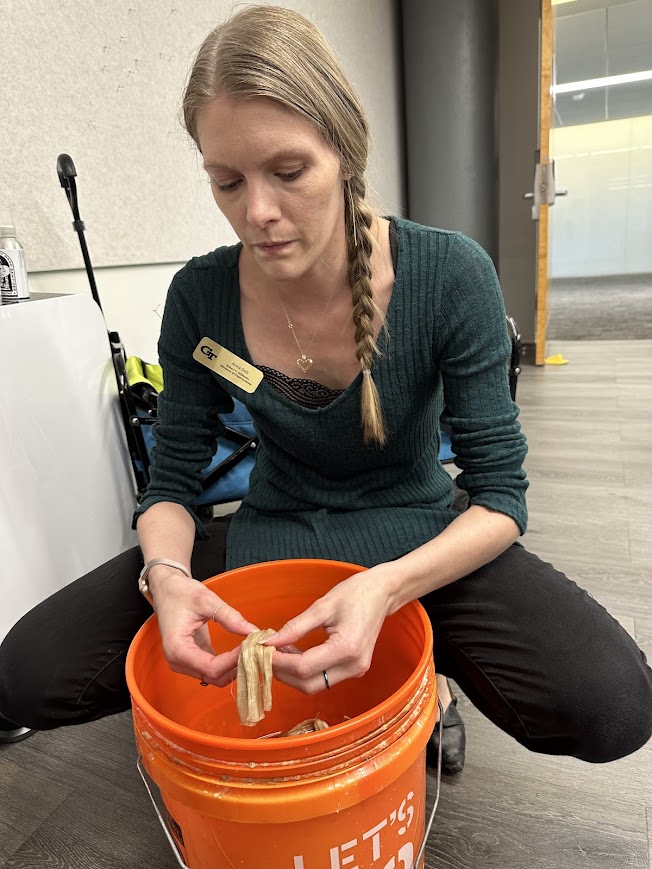Christopher Jones Wins 2023 Institute Award for Excellence in Industrial Gases Technology
Aug 28, 2023 — Atlanta, GA

Professor Chris Jones
Professor Christopher Jones was selected as the recipient of the 2023 Institute Award for Excellence in Industrial Gases Technology from the American Institute of Chemical Engineers. (AIChE).
Jones, the John F. Brock III School Chair of Georgia Tech's School of Chemical and Biomolecular Engineering (ChBE@GT), will receive the award at the AIChE meeting in Orlando, Florida, this November.
This award recognizes his contributions to ultra-dilute CO2 separations, such as the extraction of CO2 from air, also referred to as “direct air capture” or DAC. The Jones group has played a foundational role in developing materials and processes for CO2 removal from air, and in conjunction with the Lively, Realff, Sholl, and other groups in ChBE@GT, no academic institution has authored more publications on DAC than Georgia Tech.
Professors Jones, Matthew Realff, and Ryan Lively are founding members of the Georgia Tech Direct Air Capture Center, or DirACC.
Assistant Professor Akanksha Menon Awarded $3 Million for Research as part of DOE's Energy Earthshots™ Initiative
Oct 18, 2023 — Atlanta, GA

Pictured left to right: Associate Professor Matthew McDowell (ME), Assistant Professor Akanksha Menon (ME), and Assistant Professor Claudio Di Leo (AE).
Akanksha Menon, assistant professor in the George W. Woodruff School of Mechanical Engineering, has been awarded $3 million in funding from the Department of Energy (DOE) as part of their Energy Earthshots™ Initiative to advance clean energy technologies within the decade.
The initiative includes a total of $264 million in funding that will support 11 new Energy Earthshot Research Centers (EERCs) led by DOE National Laboratories and 18 university research teams addressing one or more of the specific Energy Earthshots™ that aim to accelerate affordable and reliable clean energy solutions to mitigate the climate crisis to reach a net-zero carbon goal in 2050.
Menon's project, titled Thermo-Chemo-Mechanical Transformations in Thermal Energy Storage Materials and Composites, will bring together Matthew McDowell, associate professor in the Woodruff School, Claudio Di Leo, assistant professor in the Daniel Guggenheim School of Aerospace Engineering, and Jeff Urban from the Lawrence Berkeley National Laboratory, to provide a fundamental understanding of the coupled thermo-chemo-mechanical phenomena in thermal energy storage (TES) materials that will enable low-cost and stable storage.
Chloe Arrington
Martha Grover Named Thomas A. Fanning Chair in Equity Centered Engineering
Jun 04, 2024 — Atlanta, GA

Martha Grover
School of Chemical and Biomolecular Engineering (ChBE) faculty member Martha Grover has been named the College’s Thomas A. Fanning Chair in Equity Centered Engineering. Grover was selected for her efforts to educate engineers who approach their work with an intent to close societal gaps of wealth, power, and privilege by ensuring equitable access to opportunity.
The endowed position was established via the Southern Company Foundation by Southern Company, which has been regularly recognized for its efforts to promote an organizational culture that ensures representation of all groups. Fanning recently retired as chairman, president, and CEO.
Grover is a systems engineer whose work addresses the complexity of molecular organization and how it can solve complicated grand challenges. For instance, she has worked with the Department of Energy for 10 years to create processes for separation and immobilization of millions of gallons of liquid nuclear waste at the Hanford Site in Washington and the Savannah River Site in South Carolina. She’s developed real-time process monitoring of nuclear waste slurries to increase throughput and enhance safety.
Grover’s research also focuses on the origins of life and understanding the essential role of diversity and cooperation. Her other work includes modeling and engineering the self-assembly of atoms and small molecules to create larger scale structures and complex functionality.
Jason Maderer (maderer@gatech.edu)
College of Engineering, Georgia Tech
Georgia Tech Researchers Develop More Efficient Approach for Turning Plant Biomass into Useful Chemicals
Sep 05, 2024 — Atlanta, GA

Illustration of a mechanical impact that creates a reactive environment for depolymerization of biomass into value-added chemicals.
Lignin is one of the most plentiful organic polymers on Earth, making up about 20 to 30 percent of the dry mass of wood and other plants.
Despite this abundance, lignin’s complex structure has challenged researchers in breaking it down into useful components that can be used in the sustainable production of chemicals, plastics, and fuels. Therefore, lignin is often discarded as waste during the production of paper and other plant-based products.
However, researchers at the Georgia Institute of Technology have developed an approach that could transform lignin into valuable chemicals more efficiently than ever before.
The researchers published their findings in the journal ACS Sustainable Chemistry & Engineering on using a method known as mechanocatalysis, which uses physical forces, such as vibration or rotation, in a ball mill to drive chemical reactions without the need for solvents, heat, or high pressure.
Carsten Sievers, a professor in Georgia Tech’s School of Chemical and Biomolecular Engineering (ChBE), explained that the first step in a lignin biorefinery is depolymerization, which breaks lignin down into small molecules.

Professor Carsten Sievers
Brad Dixon, braddixon@gatech.edu
TAPPI Student Chapter Career Fair 2024 - September 12, 2024 (3 - 7 p.m.)
We are excited to invite you to the TAPPI Student Chapter Career Fair, taking place on Thursday, September 12, 2024, from 3:00 PM to 7:00 PM at the Renewable Bioproducts Institute (RBI). This event is an excellent opportunity for undergraduate and graduate students and professionals in the pulp and paper industry to connect, network, and explore career opportunities, including potential internships and full-time positions with leading companies.
Renewable Bioproducts Institute at TAPPINano 2024
Jul 10, 2024 — Atlanta, GA

Collage of Georgia Tech's participation at TAPPINano2024
Faculty and students of the Georgia Tech Renewable Bioproducts Institute (RBI) were active participants at the TAPPINano 2024 conference held in Atlanta on June 10-14. The Renewable Bioproducts Institute was a gold sponsor of the annual event that focused on the topic - Building from the Bottom Up: Shaping a Sustainable World using Renewable Nanomaterials.
RBI’s Executive Director Carson Meredith was a keynote speaker at the conference and Meisha Shofner, professor in the School of Materials Science and Engineering served as the conference chair. Conference attendees had an opportunity to participate in an academic tour of RBI that included a tour of the Robert C. Williams Museum of Papermaking, located within the Renewable Bioproducts Institute.
During a session on water treatment and recovery, Zhaohui Tong, associate professor and RBI initiative lead for Waste Valorization in Food-Energy-Water and Yongsheng Chen, Bonnie W. and Charles W. Moorman IV professor in the School of Civil and Environmental Engineering participated and presented their work on nano-triboelectric cellulose membrane sensors for heavy metal ions removal and detection and next generation nano filtration membranes via machine learning-screened novel monomers respectively.
During the lunch presentation on June 11, Meredith presented his keynote on the topic “Cellulose nano materials at the Renewable Bioproducts Institute: Two decades of partnerships and progress.”
Xiaoqing Yu, graduate student at the Woodruff School presented her paper on de-wrinkling for papers coated with cellulose nanocrystal and modified celluloses.
Georgia Tech graduate students and RBI Fellows, Kim Anh Pham, Jonathan Rhone and Javaz Rolle participated in a session on cellulose based coatings, and presented their work on sustainable oxygen barrier coatings for paper based on anionic and cationic cellulose derived materials, cellulose nanocrystal coated glass fiber-epoxy composites: interfacial and tensile properties, and durable bio-based coatings for packaging applications.
Finally, during a session on CNF & MFC Sheets and Films, Fariha Rubaiya, RBI Fellow presented her work on out-of-plane auxecity in cellulose nanofibril films.
Here is a video shared by the TAPPINano 2024 organizers on the highlights of the conference.
Priya Devarajan || RBI Communications Program Manager
Clearing the Air: Georgia Tech Takes Leading Role in Scrubbing the Atmosphere
Profile on Anna Doll – Education Curator at Robert C. Williams Museum of Papermaking
Aug 20, 2024 — Atlanta, GA

Doll giving a tour of the Robert C. Williams Museum of Papermaking to K-12 Students
Anna Doll is the education curator at the Robert C. Williams Museum of Papermaking, located in Georgia Tech’s Renewable Bioproducts Institute. Doll’s day-to-day responsibilities, and the many projects she handles at the museum, bring tremendous value not only to the Georgia Tech community, but also to the papermaking community around the world.
With a degree in art education and a minor in art history, Doll began her career as an elementary school art teacher in Pinellas County, Florida. She then became the director of Museums for the Folk Pottery Museum of Northeast Georgia and the Sautee Nacoochee Cultural Center History Museum and Heritage Site.
In 2019, Doll joined the Robert C. Williams Museum of Papermaking team as its education curator. At the museum, she creates and manages programs that include educational tours, private and public workshops on papermaking, specialized workshops through creative collaborations with artists, collaborations with other campus units for STEAM activities, and community events for kindergarten through senior adult audiences.
"I didn't know a whole lot about papermaking when I first started here," admits Doll, "but I knew how to be an education curator." Her ability to swiftly absorb the history and concept of papermaking and translate it into engaging educational experiences has been instrumental in her success. Below are a few highlights of Doll’s projects.
Museum Tours
Doll’s daily activities include educational tours of the papermaking museum for groups of all ages. The tours range from introducing the papermaking process to elementary and middle school students to sharing the history and heritage of papermaking with adults. In addition, she conducts virtual programs for groups interested in the history of paper and the technological advances of the papermaking process since its invention many centuries ago.
Workshops
Doll is the point of contact for public and private workshop bookings. She also develops the concepts for these sessions, catering to groups with various interests (e.g., Girl Scouts, Boy Scouts, people with disabilities, teachers, artists, college students, and public groups). This spring, Doll’s workshops included Suminagashi, Production Papermaking, Petal Fold Book, Paper Casting, and Magic Box: Jacob’s Ladder.
In addition to conceptualizing and conducting tours and workshops, she designs curricula and other resources involving paper art and science for K-12 teachers to integrate into their art classes.
Big Paper Workshop – Convening Artists, Educators, and Community Members for a Transformative Experience in Papermaking
This spring, Doll and her colleague Jerushia Graham created a communal workshop called “Big Paper.” Offered on multiple days, this project included five college groups from Georgia and Alabama and community groups from metro Atlanta who got to create a large sheet of paper from pulp. Participants beat plant material by hand to prepare the fiber and worked with Tom Balbo, founding director of the Morgan Conservatory, to create a huge 4’x6’ sheet of paper that was mailed back to them once it was dry.
Through her work at the museum, Doll has cultivated relationships with various artists, all of whom collaborate with the museum to conduct workshops and create and showcase art exhibits.
Additional Collaborations Across Campus
Doll partners with other units on campus to create programs. She collaborated with the Georgia Tech Library on a program called “Tech's Tactile Thursdays.” Hosted on the first Thursday of each month, it allows students, faculty, and staff to work on hands-on projects related to paper and provides an opportunity for the largely technology-focused participants to take a break from their routine, relax, and explore their creative side and enhance their well-being.
Doll also has been an active educator at Georgia Tech Science and Engineering Day, which is part of the Atlanta Science Festival. This year, more than 3,000 K-12 students and parents visited Georgia Tech’s campus to engage in hands-on STEAM activities. Representing the museum, Doll worked with families to make prints on a clamshell printing press featuring a custom-designed Buzz image (designed by Doll) on a postcard for the kids to take home. The activity showcased the rich history of the printing press and modern technology with a photopolymer printing plate.
Through these diverse projects and initiatives at the museum, Doll continues to make a difference in the world of papermaking. Looking ahead, she hopes to expand the museum’s educational initiatives as well as the education team and its resources, and she envisions broadening the museum’s reach and impact by offering free programs to schools through grants. She is also working with Georgia Tech faculty and researchers on museum research into the art of nano cellulose and plans to establish a paper and natural dye garden for teaching.

Anna Doll

Anna Doll, Tom Balbo and workshop participants during the Big Paper Workshop

Doll during a paper-making session with K-12 Students

Doll prepping the fiber during Tech's Tactile Thursdays
Priya Devarajan | RBI Communications Program Manager
Fall 2024 RBI Lunch and Learn: Seeding Research Collaborations
Join the Georgia Tech Renewable Bioproducts Institute for lunch, meet our industry members, and learn about the RBI fellowship funding program. Faculty will learn how to apply for seed grants, connect with potential collaborators and discuss project ideas, and gain valuable feedback from industry and RBI leadership.
Panel Topics:
- Carbon Neutral Chemicals from Renewable Resources
- Next-Generation Renewable Packaging
- Defossilization of Renewables Manufacturing
